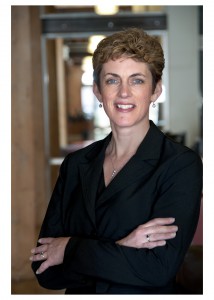
Name: Karen Catlin
Job / Title: CEO
Company: Athentica, P.B.C.
Tell me about your recent career transition. How did that come about?
I’ve actually had two major career transitions in the last 20 months. The first one was deciding to leave a great job as an executive at Adobe Systems. I wanted to pursue my passion of helping other women be successful in the software industry, so I became a leadership coach, speaker, and consultant. After spending my entire career up to that point in corporate jobs, I loved the flexibility of being self-employed. I spent time blogging to build up my personal brand, meeting with friends and former colleagues to promote my business, and growing my professional network. At this time, I joined The CLUB and became a member of the Programming committee; I’ve enjoyed meeting so many talented women through our events.
Coincidentally, the networking I did to build my consulting business led me to my second career transition. Earlier this year, a friend invited me to lunch to discuss a business idea he had. Over the next six months, we met every so often, and I saw his business idea morph into what it is today—a social network to help the growing population of online learners complete a curriculum of courses to develop mastery in a field. Along the way, I started seeing connections between his startup and women I met who were taking online classes to improve their technical skills. Many told me that they liked online classes because they could fit them into their busy lives, yet they didn’t think they were learning enough to apply to a real-world programming need. They knew they needed to take more classes and get more experience building software, but they struggled with next steps. As a result, I knew my friend was on to something.
In a surprising twist of events, my friend asked me to be the CEO of his company. I wasn’t looking for this kind of role, but I decided to consider it seriously. As I evaluated the opportunity and met more of his team, I became really excited. And I realized that, by joining the startup, I could help more women than I ever could as a consultant. With the support of my husband and kids, I decided to lean into my career once again. I’m now the CEO of Athentica, an early stage online learning startup. And I’m having the time of my life.
What drew you to a career in technology?
As a child, I was a good student, I enjoyed solving puzzles, and I loved making things. This last memory is especially strong. My family didn’t have much disposable income, and my parents instilled a strong sense of frugality in all that we did. We canned vegetables from our garden, made jam, hand-crafted gifts, and learned to sew and knit. I especially loved making my own clothes; not only did it save me money, it gave me a wonderful creative outlet.
When I was in high school, my dad showed me a magazine article of a young woman earning more money than I could have imagined. She was strong in math and science in high school, and she studied computer science in college. My dad suggested I could do the same, and I was definitely enticed by the potential salary. Growing up in such a frugal household, I knew I wanted to pursue a career where I’d be able to support myself.
A year later, I was accepted at Brown University and declared computer science as my major. In hindsight, this was pretty risky—I had never even touched a computer! Fortunately, I enjoyed my classes. Just like sewing and knitting, building software met a basic need I had to make things. I found it fun, fulfilling, and frankly addictive.
Tell me about your management style today.
As an executive and a working mom, I became a better leader because of the parenting skills I learned, and a better parent because of the leadership training I received. Not surprisingly, my leadership style is a blend of the qualities I think are important for both leaders and parents: empathetic within reason, nurturing, respectful, decisive, dependable, resilient, and calm. I put a lot of trust in the people around me and encourage them to grow their skills. Professionally, this is called “succession planning.” At home, it’s called “making sure your kids can eventually move out and support themselves!”
I see intersections of parenting and leadership on a regular basis, and I share my thoughts on my blog “Use Your Inside Voice.” Please stop by if this sounds interesting to you.
What advice would you give to a woman looking to grow in her career while making time for her family?
For today’s working parents, there are never enough hours in the day. We all develop coping skills to get it all done, some more extreme than others. What I’ve seen in myself and in my friends is that we’ve mastered the ability to shrink our household duties down to the bare minimum. Even if you have a partner who equally shares these duties (as recommended in “Lean In”), you can still simplify your life to have more time to focus on family and career.
Earlier this year, I shared my strategies for simplifying household responsibilities on my blog: http://karencatlin.com/2013/03/18/confessions-of-the-time-starved/. I’m always looking for more ideas. Please tell me about your strategies by leaving a comment on that blog post. Thanks!
.png)
